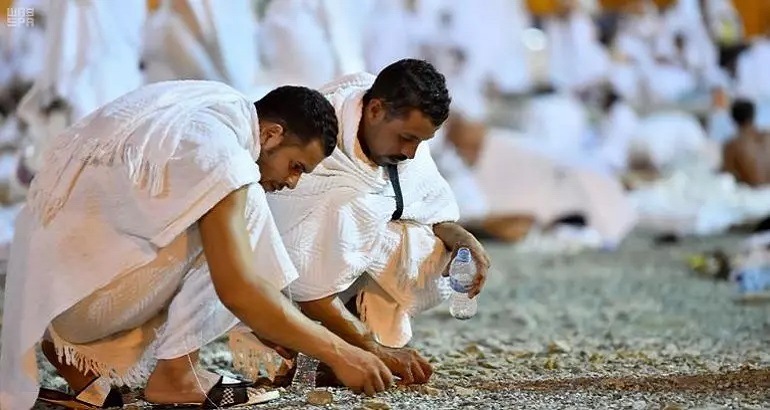The pilgrimage nears its completion. After the stoning of the Jamarat, the sacrifice, and the symbolic shedding of ego in Mina, the pilgrim returns to the Kaaba to perform the Tawaf al-Ifadah, followed by the emotionally moving Tawaf al-Wada (Farewell Tawaf). These final rites signify not just the conclusion of a physical journey, but the arrival at a spiritual destination — the heart’s reunion with its origin.
In this part of our series, we explore how the final circumambulations around the Sacred House encapsulate deep meanings of love, surrender, and longing for nearness to Allah.
Tawaf al-Ifadah: The Heart Drawn to the Divine
Tawaf al-Ifadah, an obligatory rite of Hajj, is performed after the stoning of Jamarat and sacrifice. Pilgrims return to the Kaaba and circle it seven times, mirroring the Tawaf they performed at the beginning — but this time with souls refined by Arafah, Mina, and Muzdalifah.
“Then let them complete the rites prescribed for them, perform their vows, and (again) circumambulate the Ancient House.”
— Surah Al-Hajj (22:29)
Spiritual Significance:
-
Completion and Continuation
Tawaf al-Ifadah symbolizes the fulfillment of the major rites of Hajj. Yet, it is also a reminder that the journey to Allah never truly ends — it only deepens. -
Magnetic Pull to the Kaaba
Just as the heart is drawn to its beloved, the pilgrim is drawn back to the Kaaba. This circumambulation reflects the believer’s constant orbit around Divine love and obedience. -
A Glimpse of the Hereafter
The crowds, the unity, the longing, the tears — all echo the scene of Yawm al-Qiyamah, when people will circle the Divine Throne, seeking mercy. -
Cleansing and Renewal
Having cast away sins, sacrificed desires, and submitted completely, the pilgrim now circles the Kaaba with a renewed heart, one that beats only for Allah.
The Farewell Tawaf (Tawaf al-Wada): Parting with Tears
As the pilgrimage concludes, one last circumambulation is performed — the Tawaf al-Wada, meaning the “Farewell Tawaf.” It is not obligatory for those performing Umrah alone, but for Hajj pilgrims, it is essential before leaving Makkah.
READ MORE: Hajj and Umrah: Part 6 – Muzdalifah and Mina: Between Gratitude and Sacrifice
This is perhaps the most emotional moment of the entire pilgrimage.
The Kaaba that welcomed the soul at the start now gently bids it farewell, as if to say:
“Take Me with you. Carry My remembrance in your heart always.”
Spiritual Reflections:
-
The Pain of Separation
As the pilgrim looks one last time at the Kaaba, there is grief — a grief of leaving Allah’s house, but also a hope that one’s life will now reflect the change within. -
A Promise to Live Differently
Every step away from the Kaaba is a step toward home — but not as the same person. The Farewell Tawaf is the pilgrim’s pledge to Allah:
“I will live as one who has seen Your signs, felt Your mercy, and known Your closeness.” -
Tears of Acceptance
It is said that if a pilgrim’s Hajj is accepted, they return home like a newborn. The tears shed during the Farewell Tawaf are often those of relief, gratitude, and fear —
“Did You accept me, O Allah? Have I been cleansed?” -
Love Without End
The Kaaba is not just a building. It is a symbol of Divine presence. As the pilgrim departs, the memory of circling it becomes a lighthouse in life’s stormy seas, always calling the heart back to Allah.
How These Rites Reshape a Life
Together, the Tawaf al-Ifadah and Tawaf al-Wada are much more than rituals. They reflect:
-
The cycle of life: Birth, purification, return.
-
The soul’s desire: Always moving toward Allah.
-
The believer’s mission: To return to the world with a heart that remains close to the Kaaba, even in distance.
A pilgrim who returns home should not simply bring back souvenirs — but transformed values, softened speech, a humble heart, and eyes that recognize the Divine in everything.
From Ritual to Reality: Living What You’ve Learned
As you walk away from the Kaaba, reflect on these final thoughts:
-
Will you maintain the discipline of prayer you upheld during Hajj?
-
Will you treat people with the same patience and compassion?
-
Will your love for Allah reflect in your daily decisions?
“And take provisions, but the best provision is Taqwa (God-consciousness).”
— Surah Al-Baqarah (2:197)
The true Tawaf does not end with seven circles. It begins when you return home and live in a constant orbit around the remembrance of Allah — wherever you are.
Conclusion: Hajj Ends, but the Journey to Allah Continues
Tawaf al-Ifadah and Tawaf al-Wada serve as powerful reminders that while Hajj has an endpoint, the believer’s connection to Allah never ends. With every step taken during this pilgrimage, the heart has drawn closer to its Creator. As pilgrims return to their lives, they carry a piece of the Sacred House with them — not physically, but spiritually — in the form of taqwa, sincerity, and renewed purpose.
Coming Up in Part 8: “The Return Home: Living as a Hajji Every Day”
In our final installment of this series, we will explore how pilgrims — and by extension, all believers — can maintain the spiritual momentum of Hajj and Umrah even after returning to everyday life. What does it truly mean to be a Hajji in heart, action, and character?
Author: Islam Religion Guardian Columnist
Published by: IslamReligionGuardian.com



